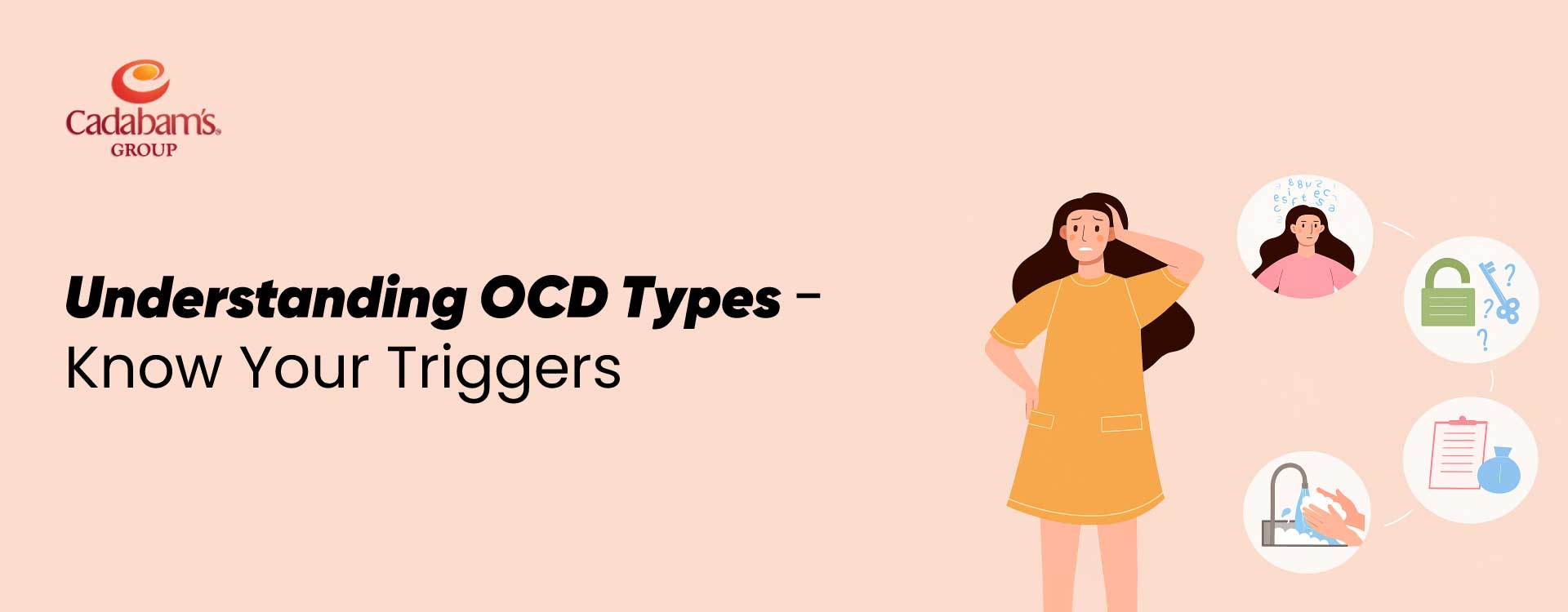Obsessive-Compulsive Disorder (OCD) is a mental health disorder characterized by individuals experiencing recurring obsessions and compulsions that are out of their control.
It is a chronic illness that causes severe distress and dysfunction in an individual. While repetitive thoughts and behaviors are common in people, e.g., obsessively checking if the doors are locked, ensuring valuable items are still in possession, and washing hands, are remarkably different for a person with OCD.
If you or your loved ones may be dealing with obsessive-compulsive disorder, then know that you are not alone. You can connect with mental health professionals at Cadabams. Our helpline number 9741476476 is available to you 24x7 for the treatment options around you. Read on to understand how to deal with OCD.
What are the treatments for OCD?
The use of the term OCD is highly misused. It is often thrown around in inappropriate situations, or individuals are made fun of if they are concerned about the cleanliness and then termed 'OCD.'
Everyday life and its adversities can cast a cloud of worry and anxiety on us that might last for days together and cause temporary distress and dysfunction. Still, individuals who are stuck in this dysfunction and pain for long periods might require professional help.
The aftermath of stressful or traumatic events might result in obsessive thoughts or compulsive behaviors as a mechanism to safeguard us from falling into the same traumatic situations. These mechanisms act as fail-safes and protections for our safety in regular life. Still, when these thoughts and behaviors become intrusive and prevent normal functioning, they can be considered out of the ordinary and may require help.
This behavior change might be gradual and may build up over time, causing distress to the individual and their personal and social circles that may go unnoticed.
The onset of the illness can be attributed to multiple factors such as genetics, the environment, brain structure, etc. Keeping a close eye out for obvious signs of such changes in behavior such as chapped hands - from over-washing due to fear of germs, weight loss - dietary restrictions due to fear of contamination is very important. Often loved ones may plan an essential role in identifying things that a person would not usually share - especially since these intrusive thoughts are irrational, even for the said individual, and they might be embarrassed about it.
Obsessive-compulsive disorder, like other mental illnesses, cannot be taken lightly and requires medical intervention in the form of therapy or medication, or in some cases both, to treat it. An OCD care plan or OCD treatment should be availed by a trained mental health practitioner only.
How is Obsessive-Compulsive Disorder (OCD) diagnosed?
How to cure OCD? Well, the first step is to diagnose OCD. OCD can be diagnosed only by a trained mental health professional using the criteria outlined by the Diagnostic and Statistical Manual of Mental Disorders.
These will include :
- Psychological evaluation: A mental health evaluation is conducted by professionals, including discussing feelings, thoughts, and behavior patterns. With the client's permission, this may include talking to their family or friends.
- Diagnostic criteria: Diagnostic and Statistical Manual of Mental Disorders (DSM-5), published by the American Psychiatric Association, is the guide to identifying mental health disorders.
OCD is diagnosed based on specific factors, including :
- An individual must have obsessions, compulsions, or both.
- The obsessions or compulsions should take up more than an hour per day.
- The obsessions or compulsions affect the individual causing distress or affecting participation in social activities, work responsibilities, or other life events.
- The symptoms should not have been caused by using drugs, alcohol, medications, or another medical problem.
- The symptoms are not from other mental disorders such as eating disorders, generalized anxiety disorders, or body image disorders).
- Physical exam. This may help rule out other problems causing one's symptoms and check for any related complications.
Options for Treating OCD
OCD is a long-lasting and chronic illness; however, there is no need to lose hope. There are multiple ways to seek help for OCD. Mental health professionals can create the best treatment plan as per the condition of the clients. Here are a few ways one can seek treatment :
Therapy to treat OCD
Cognitive Behavioral Therapy (CBT)
CBT is the most opted OCD therapy to treat individuals. It provides the client with the tool required to think, act, and react to one's unhealthy thoughts. The idea is to replace negative thoughts with productive ones.
Under CBT, two scientifically based techniques called exposure and response prevention (ERP) and cognitive therapy are used. The ultimate goal of treatment is to translate exposure to the real world, where the client will be able to resist one's compulsions and embrace uncertainty rather than fear it.
Exposure and response prevention therapy (ERP)
In ERP therapy, the client is asked to describe all obsessions and compulsions. Later, they are arranged in a list, from least frightening to most.
Next, the therapist starts with the easiest item and pushes you to enter a situation to face it without resorting to compulsive behavior.
Example - One may have an obsessive fear of germs. The therapist will design a task that exposes the client to fear, like touching a public doorknob. If the usual response is to wash hands immediately, then the therapist would ask them to wait before washing their hands. Gradually, the therapist will ask the client to stay longer and longer before washing their hands. Over time, this gradual exposure and the delayed response would help one control their fear of germs and the eventual response of washing hands. With the help of the mental health professional, the entire list is tackled, and eventually, the brain begins to learn that nothing terrible happens when one stops performing compulsive rituals.
The therapist helps the client gain confidence and learn special skills to control the compulsions through cognitive therapy. Based on the results, it is seen to be one of the best treatments for OCD.
Cognitive Therapy :
Cognitive therapy can play an essential role while dealing with ERP. It helps the client understand that the brain is sending error messages. With treatment, one will be able to recognize these messages and respond to them in new ways. This will help in controlling obsessions and compulsions.
For most people, it is easy to dismiss thoughts, but OCD clients have certain beliefs that thoughts are always important. So instead of being able to forget about these negative thoughts, their beliefs cause them to react differently, leading to distress.
Medications for OCD :
Psychiatrists or other mental healthcare providers may turn to medications to help care for OCD. Medications such as SSRIs - selective serotonin reuptake inhibitors are commonly used in treatment plans. Affected individuals sometimes may not feel the effects of the SSRIs alone even after three months and are then prescribed antipsychotic medications to help with the regulation of their chronic mental illness. Studies show that the combination of therapy and the proper intake of medicines is incredibly beneficial for the betterment of the individual. However, you must take medications only after consulting with a doctor. While treatment of OCD without medication is possible it is not advised. It is always best to consult a professional before making any decisions.
Conclusion :
OCD is a mental health disorder and like any illness, visiting a healthcare professional is never a bad idea. Calling a helpline number, speaking to someone who can give you access to a medical professional, seeing a mental health clinic, or even choosing the option to do all these things are significant first steps towards your recovery!
.webp)







